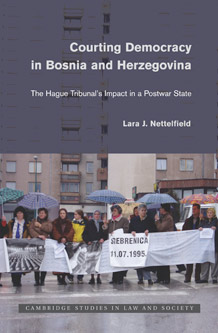-
- Information for new students
- About us
- News
- Events
- Prospective undergraduates
- Prospective postgraduates
- Employability
- Research
- Staff profiles
- Arab and Islamic Studies
- Education
- Law
- Politics
- Sociology, Philosophy and Anthropology
- Strategy and Security Institute
- Exeter Q-Step Centre
- Outreach
- Alumni
- Contact us
- Health and Safety
- Current students
- Staff intranet

The book’s front cover
Research on transitional justice in Bosnia and Herzegovina wins major prize
University of Exeter politics lecturer Lara Nettelfield’s book, Courting Democracy in Bosnia and Herzegovina: The Hague Tribunal’s Impact in a Postwar State has won the prestigious Marshall Shulman book prize.
The prize is awarded for an outstanding monograph dealing with international relations, foreign policy, or foreign decision making of former Soviet Union or Eastern European states.
The book looks at the impact of the International Criminal Tribunal for the former Yugoslavia (ICTY) in The Hague on five segments of Bosnian society. Cambridge University Press published the book in 2010 as part of its Cambridge Studies in Law and Society series.
Dr. Nettelfield’s research found that the court has made positive contributions to the country’s transition to democracy, contributions that have been underappreciated by earlier analysts. She argues, “Much of the early rhetoric about the transformative potential of international criminal law helped foster unrealistic expectations that institutions like the ICTY could not meet, but judged by more realistic standards, international law is seen to play a modest yet important role in postwar transitions.” The findings of this study have implications for the study of international courts around the world and the role law plays in contributing to social change. Former ICTY Chief Justice Richard Goldstone called the book, “..essential reading for anyone interested in war crimes tribunals and their place in transitional justice.”
The monograph is based on more than three years of field research and several hundred interviews. It utilizes multiple methodologies and brings together the results of surveys, ethnography, and archival materials. Courting Democracy in Bosnia and Herzegovina also emphases the role of the social setting in translating international law in domestic contexts. This year’s prize committee noted, “Nettelfield's work demonstrates the promise held out by multiple methodological approaches. Without her ethnographic sensibility, her years of on-the-ground soaking and poking, and her fielding a survey that had already been executed by other scholars in a different time and place, she never would have been able to redefine the way we think about the possible salutary effects of transitional justice.” Similarly, Professor David Scheffer, Northwestern University School of Law, and former US Ambassador for War Crimes observed, “This book slays a few dragons and introduces refreshing clarity to a very challenging subject.”
Professor Andrew Massey, Head of Politics at the University of Exeter said: “"We are delighted that Dr. Nettelfield has been chosen to receive this prestigious book prize. It is a mark of the importance of Lara's research and the potential impact it can have internationally."
Dr. Nettelfield noted that the prize was a personal, in addition to a professional, tribute. She said: “It is a tremendous honour to be recognized by my more senior colleagues in the academy, and it is also a personal one, as I had the good fortune to know Marshall Shulman. I even attended his 90th birthday party at the Harriman Institute. He was an inspiring person who was committed to scholarly excellence and service to community.”
Shulman was a speechwriter for Dean Acheson (US Secretary of State under Truman) and an advisor to Secretary of State Cyrus Vance in the Carter administration. He was the longest serving director of Columbia University’s Russia Institute (now the Harriman Institute). His best-known book was titled Stalin’s Foreign Policy Reappraised (Harvard University Press, 1963).
The prize is sponsored by the Harriman Institute of Columbia University and is awarded annually by the Association for Slavic, East European, and Eurasian Studies (ASEEES) (formerly AAASS). The prize is dedicated to the encouragement of high quality studies of the international behaviour of the countries of the former Communist Bloc and awarded each year during the annual awards presentation of the ASEEES convention.
Dr. Nettelfield’s research addresses the fields of transitional justice, human rights, international law, democratic transitions and humanitarian intervention. She is currently completing her second book (with Sarah Wagner, University of North Carolina, Greensboro) Srebrenica in the Aftermath of Genocide (Cambridge University Press).
Date: 5 January 2012
